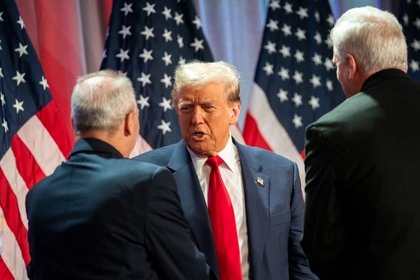Donald Trump’s latest cabinet appointments are likely the most controversial: he has picked anti-vaccine activist Robert F. Kennedy Jr. as health secretary and Matt Gaetz, who supports the conspiracy theory that Trump’s 2020 election was stolen, as attorney general.
Tulsi Gabbard, who accuses the Biden administration of disregarding Russia’s “legitimate security interests” in Ukraine, is to head the intelligence services. Commentators assess the risks.
JOIN US ON TELEGRAM
Follow our coverage of the war on the @Kyivpost_official.
A worrying trend
The appointment of Matt Gaetz as attorney general shows how far Donald Trump will go to dominate US politics, The Economist (Great Britain) notes:
“He was investigated, though never prosecuted, over allegations of sex-trafficking a minor by the FBI, an agency he would oversee. Given Mr Trump’s campaign talk of retribution, the independence of the Department of Justice is more important than ever. ...There is a pattern here. When Mr Trump has the whip hand - over the State Department, say - he appoints conventional candidates. When he suspects that the bureaucracy will resist him, he favors people who will fight the institutions they are supposed to be running.”
Wrecking-ball politics
Trump’s choice of Tulsi Gabbard for director of national intelligence is not without some merit, writes the Tages-Anzeiger (Switzerland):
“Her lack of experience may even be one of the reasons why he nominated Gabbard, a move that no one in Washington had expected. Trump distrusts the intelligence services, which he perceives as a hostile ‘deep state.’ Gabbard’s nomination could prompt disillusioned officials to resign of their own accord. The resulting chaos would allow Trump to rein in the intelligence agencies. Gabbard is part of the wrecking ball with which Trump is also threatening the defense and justice departments.”

Sanctions Busting: Germany’s Role in Dodging Russian Sanctions
Obedience before expertise
During Trump’s first term in office, there was often strife in his team. He has learned from his mistakes, Dnevnik (Slovenia) concludes:
“Eight years later, Trump is prepared... The selection was obviously made in advance, and the most important criterion is loyalty. Measured against the appointments in some important ministries, above all the Department of Justice, the experience criterion was clearly of secondary importance in contrast to the first time. This time, Trump wants obedient people, not experts with their own plans. This is the only way he is likely to achieve what he has set out to do. And he wants people who are far removed from the so-called establishment. If they kick up dust, they might even be better.”
Senate will have the last word
TVNet (Latvia) analyses Trump’s choices:
“Even the most seasoned observers of US politics are shaking their heads in disbelief at these nominations... It should be noted that although Trump gets to nominate the members of his administration, they as well as almost 1,000 other contenders for other positions will have to be formally approved by the US Senate... At the moment, it looks like the Republicans will have a narrow majority in the Senate, but it would only take a few Republican senators who don’t like the respective candidate to reject a nomination together with the Democratic opposition.”
Dream administration thanks to a loophole?
Trump could try to push through his nominees without the consent of the Senate, Corriere della Sera (Italy) fears:
“The law states that the president can appoint and install officials without a vote if urgent appointments are pending or emergencies arise during breaks in the Senate session. It’s an old rule from the days when people rode horses, and convening Congress could take a long time. Bush and Clinton often used it. Obama did too, but much less frequently, not least because the Supreme Court declared many of his appointments invalid and the procedure unconstitutional in 2014. But Trump seems determined to override this, knowing full well that he himself has since remodeled the court.”
They’ll all go soon enough anyway
This initial administration is not all that relevant, columnist Fehmi Koru comments in Karar (Turkey):
“Trump is an impetuous man. So, it quickly became clear who he would appoint to key position... However, I don’t think it’s particularly productive to dwell on these people now, because there wasn’t a single member of Trump’s initial team in his previous presidency who was still in office when he left the White House.”
You can also highlight the text and press Ctrl + Enter






